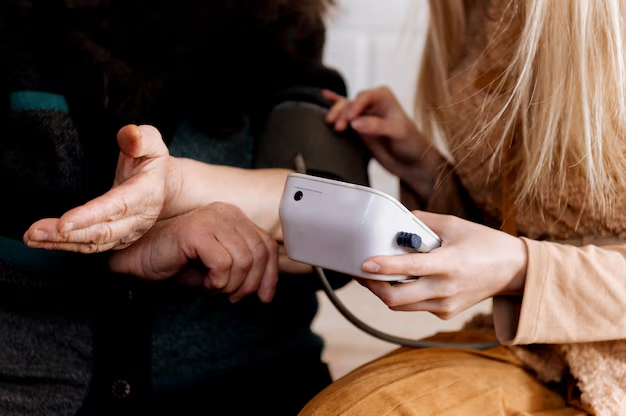Your Guide to What Is Stage 1 Hypertension
What You Get:
Free Guide
Free, helpful information about HyperTension FAQ and related What Is Stage 1 Hypertension topics.
Helpful Information
Get clear and easy-to-understand details about What Is Stage 1 Hypertension topics and resources.
Personalized Offers
Answer a few optional questions to receive offers or information related to HyperTension FAQ. The survey is optional and not required to access your free guide.
Understanding Stage 1 Hypertension: What You Need to Know
If you've been diagnosed with Stage 1 Hypertension, you might be wondering what exactly this means for your health and lifestyle. Stage 1 Hypertension, defined by a systolic blood pressure of 130-139 mm Hg or a diastolic blood pressure of 80-89 mm Hg, is a sign that your blood pressure is higher than ideal but not yet in the highly dangerous zone of Stage 2 Hypertension. It's a crucial point where taking action is imperative to prevent serious cardiovascular issues in the future.
What Causes Stage 1 Hypertension?
Several factors can contribute to elevated blood pressure:
- Lifestyle Choices: These include smoking, excessive alcohol consumption, a high-sodium diet, physical inactivity, and obesity.
- Genetics: A family history of hypertension can predispose you to high blood pressure.
- Stress: Chronic stress and poor stress management can lead to an increase in blood pressure.
- Medical Conditions: Conditions like diabetes or kidney disease can increase the risk of hypertension.
Why Does Stage 1 Hypertension Matter?
Stage 1 Hypertension signals the beginning of potential health risks such as heart disease, stroke, and kidney problems. The good news is that it's often manageable through lifestyle modifications and possibly medication if prescribed by a healthcare provider. Addressing it early can prevent the progression to more severe health conditions.
What Can You Do?
Lifestyle Changes: The cornerstone of managing Stage 1 Hypertension is adopting healthier habits. Here are a few effective strategies:
- Healthy Diet: Embrace a diet rich in fruits, vegetables, whole grains, lean proteins, and low-fat dairy products. Consider the DASH diet, which is specifically designed to combat high blood pressure.
- Regular Exercise: Aim for at least 150 minutes of moderate-intensity aerobic exercise per week, like brisk walking or cycling.
- Weight Management: Losing even a small amount of weight can significantly reduce blood pressure.
- Limit Alcohol and Quit Smoking: Reducing alcohol intake and quitting smoking have immediate and long-term health benefits, including lowering blood pressure.
- Stress Reduction: Techniques such as yoga, meditation, or deep-breathing exercises can help manage stress effectively.
Exploring Financial and Educational Resources
High blood pressure management can sometimes require financial outlay, whether for healthier food options, gym memberships, or medications. Fortunately, various financial assistance programs and educational opportunities can help lighten the load.
Financial Assistance and Educational Opportunities
Improvement in blood pressure can lead to overall better health and reduced financial burden in the long run. Here's how you can take advantage of resources to support this journey:
💼 Government Aid Programs: Look into Medicaid or local public health programs that offer subsidies for medical expenses and wellness initiatives.
💳 Credit Card Solutions: Some credit cards offer wellness benefits, like cash back on gym memberships or healthy grocery purchases.
📚 Educational Grants: Investigate grants for health education courses that focus on nutrition and lifestyle changes. Many community colleges offer affordable classes designed to foster healthier living.
🏥 Non-Profit Organizations: Several non-profit organizations offer financial support for medications or health screenings. Programs often include sliding scale fees based on income.
By making informed lifestyle adjustments and utilizing available resources, managing Stage 1 Hypertension becomes achievable and sustainable. Taking these steps not only enhances your health but also provides a foundation for financial stability and security in your wellness journey.
What You Get:
Free HyperTension FAQ Guide
Free, helpful information about What Is Stage 1 Hypertension and related resources.

Helpful Information
Get clear, easy-to-understand details about What Is Stage 1 Hypertension topics.

Optional Personalized Offers
Answer a few optional questions to see offers or information related to HyperTension FAQ. Participation is not required to get your free guide.


Discover More
- a 66 Year Old Female With a History Of Hypertension
- Are Eggs Bad For Hypertension
- Are Eggs Good For Hypertension
- Are Endocrine Disorders Causing Hypertension Rare
- Can Adderall Cause Hypertension
- Can Alcohol Cause Hypertension
- Can Allergies Cause Hypertension
- Can Anemci People Get Hypertension
- Can Anemia Cause Hypertension
- Can Antibiotics Cause Hypertension
